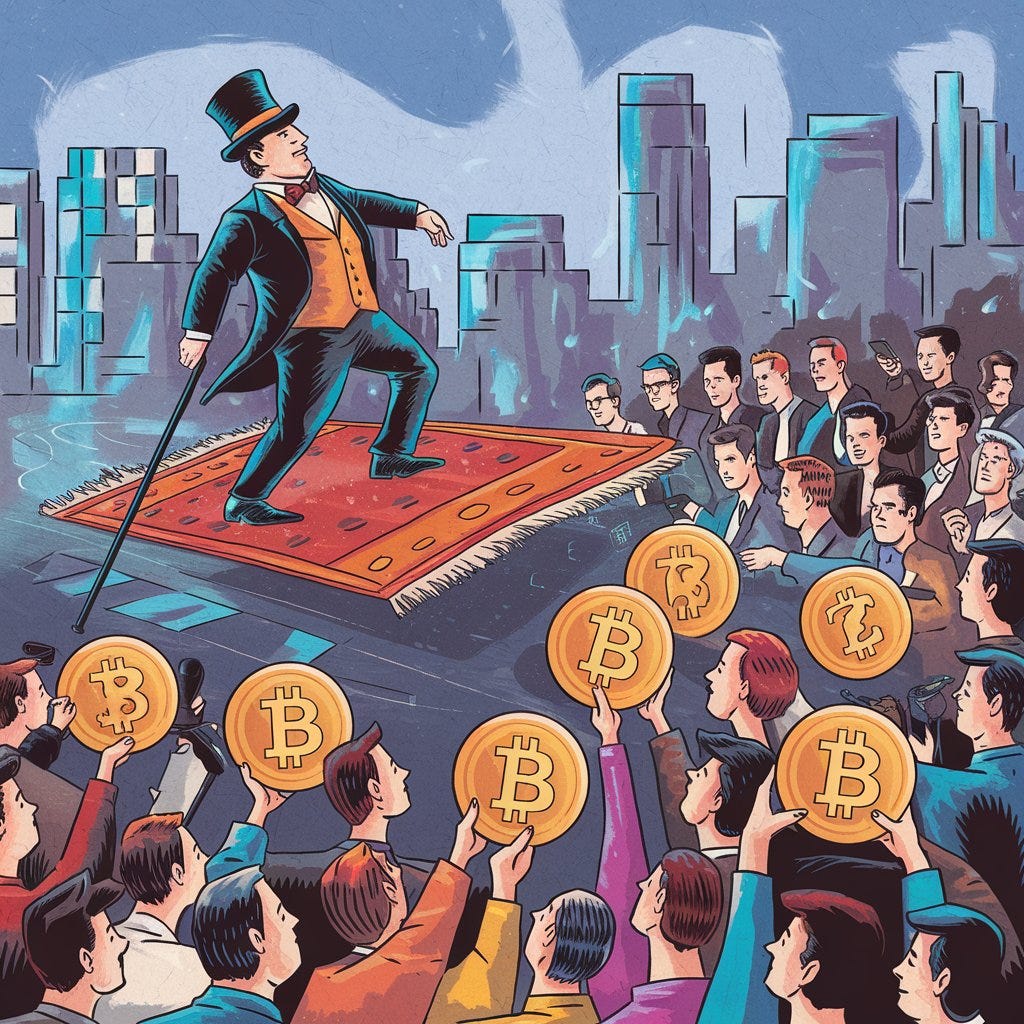72: The Rise of the Rug Pull Economy
The cryptocurrency revolution promised a future of financial freedom, but for many investors, it’s increasingly feeling like a precarious game of high-stakes poker. In 2024, the rug pull emerged as a potent symbol of both the opportunities and pitfalls of decentralized finance (DeFi).
2024 was a good year for Rug Pulls
This past year alone, rug pulls, a scam where organizers abscond with investors’ funds, accounted for 58 documented incidents, siphoning an estimated $106 million from the pockets of investors. These scams ranged from small-time grifts, such as a $30,000 live-streamed rug pull by a teenage trader, to larger operations like the SHARPEI Token scam, which wiped out $54 million in market value overnight.
The cumulative losses tell only part of the story. Rug pulls often target retail investors drawn in by slick marketing, social media hype, and the promise of rapid returns. For example, meme tokens and NFTs have proven particularly fertile ground for fraudsters, with projects like Undead Apes exploiting cultural trends to attract victims. The total financial impact of these scams often reverberates beyond direct losses.
In some instances, the consequences have turned tragic. The fallout from these scams has led to lawsuits, bankruptcies, and even personal devastation, such as the case of the Undead Apes NFT scheme, where one perpetrator took his own life before facing sentencing. This human toll underscores the high stakes involved and the far-reaching consequences of these fraudulent practices.
A Cultural Dynamic Ripe for Exploitation
The allure of quick wealth in the cryptocurrency world creates a cultural dynamic ripe for exploitation. A mix of speculative fervor, decentralized anonymity, and a lack of accountability fosters an environment where opportunists thrive. The ethos of the crypto community often emphasizes personal responsibility and minimal oversight, creating a space where scams can operate under the guise of innovation.
Market dynamics further exacerbate the problem. Rapidly rising token valuations incentivize developers to cash out at the peak of the hype cycle, often leaving investors with nothing. The decentralized nature of these markets means that fraudsters can disappear without consequence, while the speed of information spread through social media amplifies both the rise and collapse of these schemes. Rug pulls thrive both in the absence of regulation and in a culture of speculative excess mixed with unchecked optimism.
As the incoming administration signals its enthusiastic embrace of cryptocurrency, their focus is squarely on wealth creation rather than regulatory safeguards. By positioning blockchain and digital assets as cornerstones of economic growth, they aim to capitalize on the financial potential of these technologies. However, this approach leaves significant gaps in addressing the darker aspects of the crypto economy, including fraud and market manipulation.
Rather than intervening to curtail these scams, the administration’s policies may inadvertently create an environment where unjust wealth accumulation becomes normalized. By prioritizing growth and innovation over investor protection, they risk fostering a landscape where the winners are those who exploit the system most effectively.
What comes next?
Entrenchment of Wealth Inequality: Without intervention, the crypto economy may increasingly favor those with insider knowledge and access to resources, exacerbating existing economic divides. Rug pulls exemplify how wealth is often redistributed upwards in this space, leaving retail investors to shoulder the losses.
Erosion of Trust: As rug pulls and similar schemes proliferate, trust in cryptocurrency markets may further erode, deterring both institutional and retail participation.
Speculative Culture Dominates: The normalization of speculative excess could entrench a culture of gambling over innovation, sidelining projects with real-world utility in favor of those designed to exploit hype cycles.
Economic Distortion: The concentration of wealth among a few successful scam operators or large players could distort economic dynamics, leading to an uneven distribution of power within the crypto ecosystem and beyond.
The rise of the rug pull economy isn’t just a cautionary tale; it’s a reflection of the cultural and market dynamics shaping the future of cryptocurrency. If these trends persist, they will likely deepen economic inequalities and reinforce unjust systems of wealth creation.
As the incoming administration doubles down on cryptocurrency’s potential for wealth generation, the question isn’t whether crypto will drive economic growth, but who will benefit from it. Will the crypto economy become a tool for broad-based prosperity, or will it cement a system where exploitation is the norm? As always, the future of authority is in flux.




